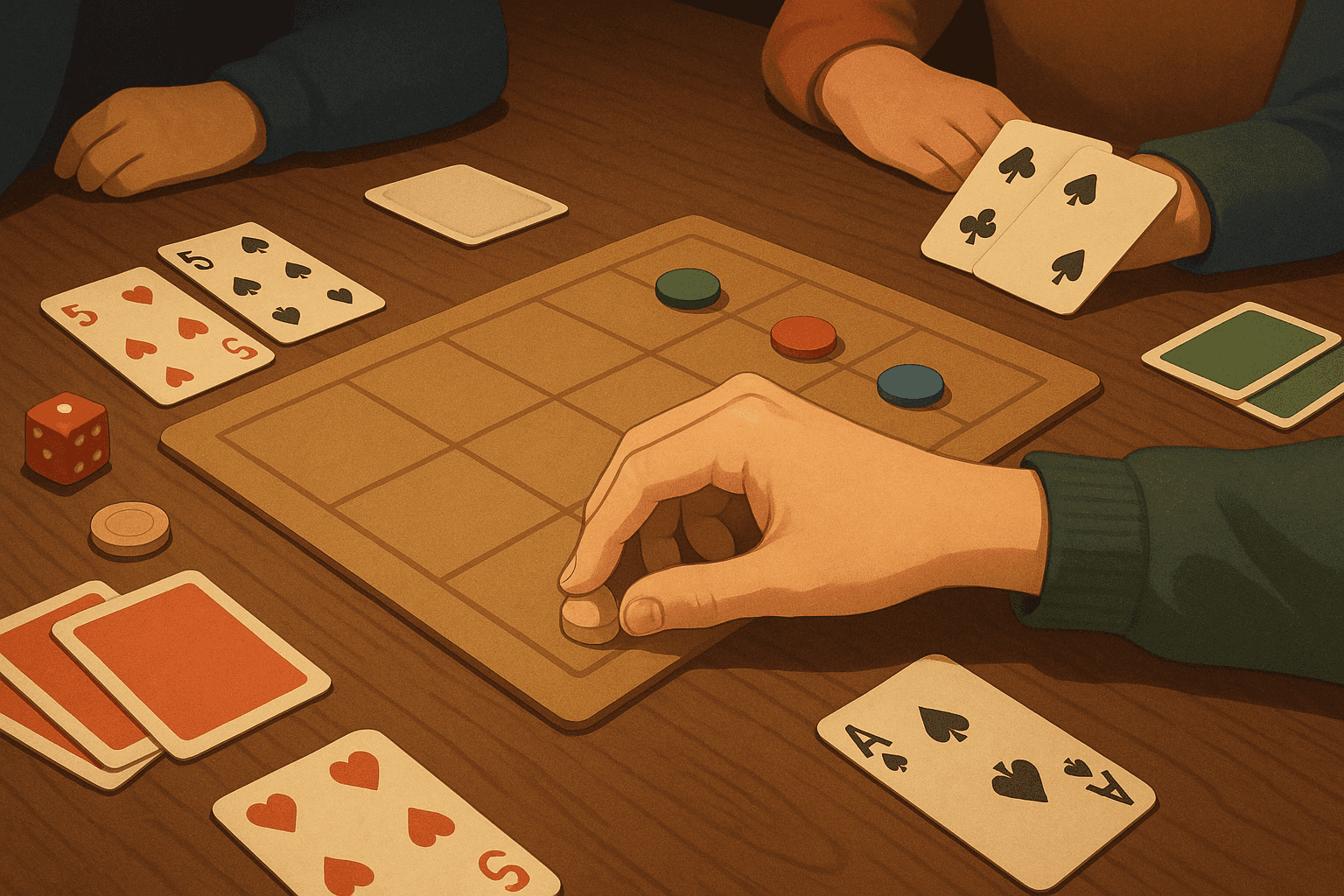
The Psychology of Cheating - Why Some Players Bend the Rules
Cheating is one of the oldest and most universal aspects of play. From secretly moving a token in Monopoly to exploiting a glitch in an online game, nearly everyone has witnessed or even participated in some form of rule-bending. While cheating is often condemned, it offers an intriguing window into human psychology - revealing how we respond to competition, temptation and social pressure.
Understanding why people cheat doesn’t excuse the behavior, but it helps explain the complex relationship between fairness, emotion and the desire to win. You can explore more articles about the nature of play and game behavior on Playiro.com.
Created By Adam Davis Fernsby
What Counts as Cheating?
Cheating isn’t always as straightforward as it seems. In some games, the line between creativity and dishonesty can blur. Adjusting a rule for convenience, peeking at cards, or quietly changing the score might all qualify as cheating, yet in many casual settings players treat these acts as harmless. The key distinction lies in intent. If an action undermines the fairness or integrity of the game, it becomes cheating.
At the same time, some games are built on deception — think of bluffing in Poker or hidden roles in social deduction games. These are forms of “honest dishonesty,” where misdirection is part of the rulebook. The challenge is that real cheating breaks the social contract that games rely on: the shared belief that everyone is playing by the same system. For readers who enjoy the structure and strategy behind different card titles, see our full overview of card games.
Why People Cheat – Psychological Motivations
So why do people cheat in the first place? Psychologists point to a mix of emotional and cognitive factors. One of the strongest motivators is the need for control — the sense of wanting to influence uncertain outcomes. Games are structured systems with chance built in, and bending the rules can feel like reclaiming power from randomness.
Competitiveness also plays a role. Some people are driven by a deep desire to win, regardless of how it happens. For others, cheating stems from insecurity — the fear of losing or appearing less capable. This can lead to “just this once” reasoning, where players justify small dishonest acts as harmless exceptions.
A concept known as moral disengagement helps explain this behavior. When people cheat, they often rationalize it by convincing themselves that the stakes are low or that “everyone else is doing it.” Research has shown that cheating increases when social norms are weak or when individuals feel they’ve been treated unfairly. Once one person bends the rules, others are more likely to follow.
The Role of Personality and Environment
Cheating is influenced by both personality and environment. Studies suggest that traits like impulsivity, narcissism and low empathy are linked to higher chances of dishonest play. These individuals are more willing to prioritize self-interest over fairness.
However, context matters just as much. Even honest players may cheat under pressure — especially when they’re losing or playing against aggressive opponents. The atmosphere of the game can change moral boundaries.
Psychologists refer to this as cheating contagion: when one dishonest act spreads through a group. If players see someone get away with a small rule break, they’re more likely to imitate it. The same mechanism appears in workplaces and classrooms — evidence that moral behavior is highly social and situational.
Cheating in Friendly Games vs. Competitive Settings
How we perceive cheating depends heavily on where it happens. In friendly home games, rule-bending is often brushed off with laughter or mock outrage. Players may even treat it as part of the entertainment, provided it doesn’t harm anyone’s enjoyment.
In professional or competitive settings, however, cheating undermines trust and credibility. A single violation can ruin reputations or invalidate results. Online gaming communities face similar issues, where the anonymity of the internet can encourage dishonest play. Interestingly, many players who would never cheat in person feel less guilt doing so behind a screen, where social cues and accountability are weaker.
Can Cheating Be Fun?
It might seem counterintuitive, but some players find cheating enjoyable — not because they crave unfair advantage, but because of the thrill of secrecy. Psychologists describe this as transgressive play, where breaking rules offers a temporary sense of excitement or rebellion. In some cases, the fun lies not in winning, but in “getting away with it.”
This helps explain why games involving bluffing or hidden information are so popular. They let players experience the psychology of deceit safely, within boundaries everyone agrees on. It’s a fascinating paradox: the enjoyment of cheating can exist even when it’s officially permitted. If you’re interested in the overlap between traditional games and gambling psychology, you can explore our section on casino games.
Preventing Cheating Without Killing the Fun
While fairness is essential, over-policing can make games rigid and joyless. The key is balance. Here are some practical ways to maintain integrity without losing the social spark that makes games fun:
- Set clear rules before play begins so everyone knows what’s acceptable.
- Encourage honesty through positive reinforcement, not punishment.
- Use transparent scoring or open cards to reduce temptation.
- Avoid overly competitive atmospheres that put pride above enjoyment.
- Celebrate clever strategies that stay within the rules — it channels the same creativity that fuels rule-bending.
Understanding Cheating Makes Us Better Players
Cheating in games is rarely about evil intent. It’s often about curiosity, insecurity or the simple desire to feel in control. Recognizing these motivations helps us understand not only games but also human behavior in everyday life. After all, fairness isn’t just a rule — it’s a shared belief that makes play meaningful.
By studying the psychology of cheating, we don’t just learn how to prevent it; we learn how to design better games, build stronger trust and appreciate the fragile balance between competition and cooperation that makes play so uniquely human.